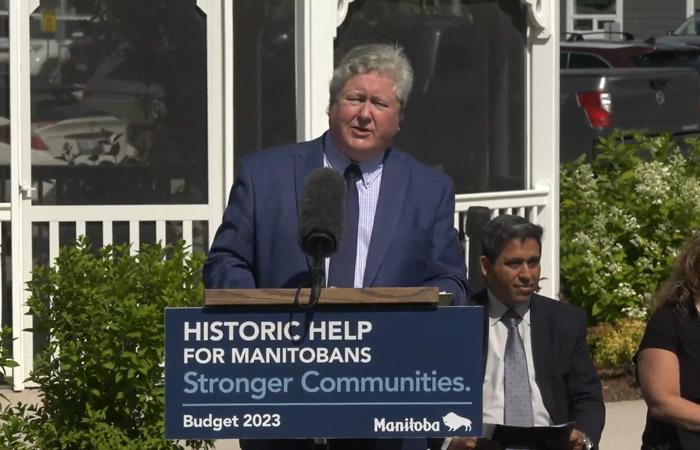More Manitoban seniors can look forward to accessible housing options in their communities as the Manitoba government advances to the planning stages for new personal care homes.
“As we age, our needs change, and it’s critical that we have a plan to provide housing options that appropriately meet these needs,” said Seniors and Long-term Care Minister Scott Johnston. “With the recently released seniors strategy, our government is working towards making Manitoba an ideal place to age. We have learned many lessons in recent years and are building on that to create housing options for Manitoba seniors that are among the best in Canada.”
In recent years, the Manitoba government has opened new personal care homes in Carman, Niverville and Steinbach. The minister noted these locations have been recognized for their design and innovation, and are studied by other jurisdictions for the way they are successfully redefining personal care home beds by making them feel more like home, with access to a continuum of care.
Six more personal care homes will be built with four located in the Interlake-Eastern Regional Health Authority (IERHA) in Arborg, Lac du Bonnet, Oakbank and Stonewall. The other two facilities will be in Winnipeg, including one in the Bridgwater neighbourhood and one on Portage Avenue. The sites were selected to build capacity in areas with the highest needs, and will include approximately the following number of beds per project:
- Arborg: 60
- Lac du Bonnet: 95
- Oakbank: 96
- Stonewall: 144
- Winnipeg (Bridgwater): 143
- Winnipeg (Portage Avenue): 140
“We are pleased that the Manitoba government is making concrete investments to support the seniors strategy,” said Sue Vovchuk, executive director, Long Term & Continuing Care Association of Manitoba. “As our population continues to age more creative and accessible options are more necessary than ever and the announced communities of care are innovative and progressive in service delivery to our valued seniors, which will help them age in their respective communities.”
The initiative will encourage a ‘physical village model’ that purposefully incorporates social interaction, functionality and intergenerational contact, while taking affordability and safety into consideration. The concept relates to the strategic initiatives as part of the seniors strategy, which promote the development of virtual and physical village models that include a range of progressive supports and services, available to Manitobans as they age, Johnston added.
“The World Health Organization (WHO) and United Nations launched the Decade of Healthy Aging in 2021 and Manitoba is on the right track,” said Connie Newman, executive director, Manitoba Association of Senior Communities. “With the development and launch of the seniors strategy in February, we’re following the outline of WHO, which stated we need to change how we think, feel and act towards age and aging.”
Approximately 670 beds are tied to the six projects, with an exact number to be determined as planning and design work progresses said Johnston. The Manitoba government has authorized $15 million to advance the planning and design phase, the minister added.
The planned personal care homes are not the only projects moving forward to support seniors. Two other projects—in Brandon and Winkler—will construct 42 behavioural beds that can provide highly specialized care for seniors with complex mental health or behavioural needs in a safe, supportive environment, the minister said.
The Manitoba government will also pilot a Community Supportive Living program in select communities that will create approximately 105 spaces in the first phase, and 288 overall. In IERHA, the pilot will be located in Ashern/Eriksdale, and Selkirk. In Prairie Mountain Health it will be in Swan River and in Southern Health Sante Sud, Emerson-Franklin.
“Seniors with complex health-care needs who do not require a personal care home deserve affordable and innovative community-based housing with on-site care supports to be available closer to them so they can continue to live active, independent lives as long as they can in the communities they call home,” said Vikas Sethi, provincial clinical integration lead, Shared Health. “This pilot project is a response to that sentiment and is supported by Manitoba’s Clinical and Preventive Services Plan .”
The Canadian Institute for Health Information indicates that Manitoba has the highest percentage of new long-term care residents that potentially could have been cared for in community with appropriate supports. The plan identified the need for affordable housing with supports model for seniors with varying degrees of complex care needs closer to home to prevent premature placement in personal care homes.
“This new housing-with-supports program will provide safe, supportive care to seniors with chronic and complex needs in a home-like environment, preventing premature placement in a personal care home,” said Johnston. “The program features provincially standardized accommodation and service package rates, as well as subsidy assistance for those who are eligible, to ensure affordability.”
The program will have three tiers of support and will include 24-7 onsite staff for personal care supports for all clients in the program, said Johnston. Clients with more complex needs will have 24-7 nursing supports. The service package will include meals, laundry, and light housekeeping, for all clients. There will also be onsite therapy aides and recreational supports as well as access to other health-care professionals as needed.
A request for proposals will be issued to identify service providers who may wish to develop and deliver Community Supportive Living services.
The minister noted that since the release of Manitoba, A Great Place to Age: Provincial Seniors Strategy in February, the Manitoba government has committed over $34 million in multiple key initiatives, many of which focus on creating safe, inclusive, accessible communities.
“Our government continues investing in initiatives that will provide Manitoba seniors with enhanced access to comprehensive services and supports that meet their needs, support their independence, and enhance their quality of life,” said Johnston.
Following planning and design work, construction of the six new facilities will exceed the Manitoba government’s commitment to open 1,200 new personal care home beds by 2025, Johnston noted.





